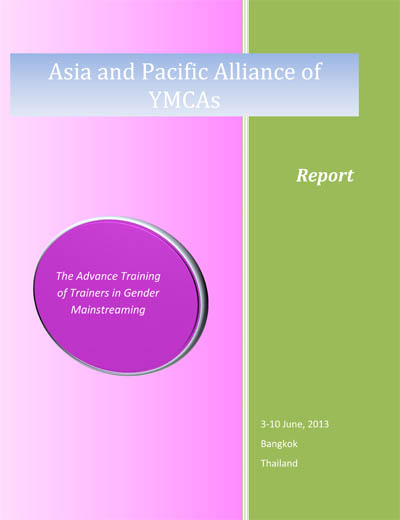The Advance Training of Trainers in Gender Mainstreaming, June 3-10, 2013
Last Updated (Wednesday, 11 September 2013 17:00)

I. Introduction:
As earlier shared, after long years of attempts and efforts to advance our responses and achieve positive change in gender mainstreaming towards social change through the YMCA work, the eighteen (18) participants including resource persons to the Advance Training of Trainers in Gender Mainstreaming from seven (7) national and local movements including Bangladesh, India, Indonesia, Japan, Philippines, Sri Lanka and Thailand, realized that YMCAs need to strive harder in their quest towards their gender mainstreaming goals. Following the initial Gender Mainstreaming training held in Jakarta in November 2012, this follow-up training was conducted on 3-10 June 2013 in Bangkok, Thailand. The need to further the YMCAs’ initiatives and responses in integrating gender mainstreaming process into the overall work of the movement is in itself a strengthening aspect as both women and men could become decision makers to sustain growth and development of the movement.
As has been written, shared and discussed in some platforms, “gender equality is the goal of gender mainstreaming. It requires integration of gender equality concerns into every aspect of the development process, including governance of an organization. It is a powerful tool for social change because it takes into account and responds to the intersections of power, wealth, knowledge, capabilities and rights in creating and sustaining gender inequality. It has been noted that YMCA, after 25 long years or more of taking this issue-based APAY thrust, has not gained much experience that can be shared as part of a strategic and specific action plans. Though it recognized this leadership initiatives to include it in the strategic goals, we know that in practice, there are no effective and tested strategies to help achieve institutional and social change in our respective movements and through response programs in communities we work with.
During the advance training of trainers, we affirmed that it is not simply an issue within a sector as earlier expressed during the Committee meeting and series of training, but more of an overarching issue of patriarchy and gender inequality. The participants realized that the use of a “code” to help analyze and understand the ‘web-like’ condition of a “poor working girl in Asia” would lead us to further questions to examine the causes and effects of gender stereo- typed roles which have been perpetuated by different institutions including religion, education, organization/workplace, media, family, supra-state, market and state. If policy/program formulation is the key challenge, what is the specific institutional factor that hinders change? What is our experience in changing the environment, beliefs, norms, organizations, attitudes and actions which shape gender mainstreaming processes? Is structural change the first concern or is it our own personal conversion from our own prejudices and mindsets? With this advance learning and training skills of this small group of YMCA staff and leaders, we hope that we will continue to journey together to achieve our goals in promoting peace, harmony and justice in all of God’s creation through the YMCA...
